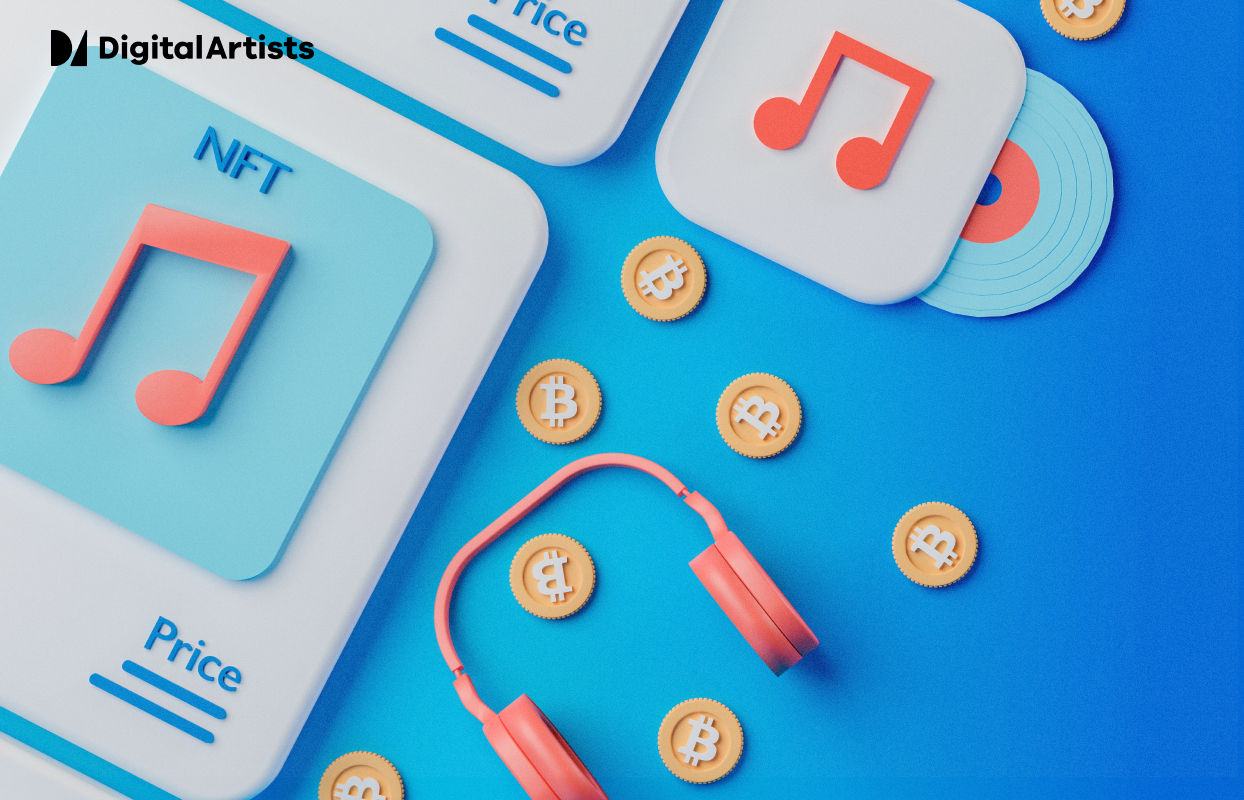


Experiencing an earworm is such an occasional event nowadays. That catchy tune catching your attention and you not being able to let go of it for some time. That is all thanks to the wonderful music being created daily by various artists. These artists are influencing figures for their fans and the interaction between the two is as important for the fans as it is for the musician’s career growth. It’s a natural human instinct to feel connected to something that makes you feel included and seen, so when artists interact with their fans in different ways like concerts, social media and meet and greets, they’re securing a loyal fan base.
Many musicians are constantly looking to expand the idea of that, to create a more innovative way to connect with their audiences and to ensure that they are being listened to. This is a business strategy of course, but it is also something quite personal, because any musician would probably want to connect with the people whom they count on to appreciate their art. Coming up with unique experiences for their fans might not come easy, but that’s exactly why NFTs in music are a revolutionary way to boost any music business. This type of NFTs come with numerous benefits and those are exactly what this article will focus on.
NFTs, as we have learned to know them, usually represent an artwork or a collectible picture or video with effects (for example a moving picture or colours shifting). The industry, however, is constantly changing, people are trying to adapt their businesses to show a progressive mindset to their customers, old and new, and are always trying to figure out how exactly NFTs can help their businesses.
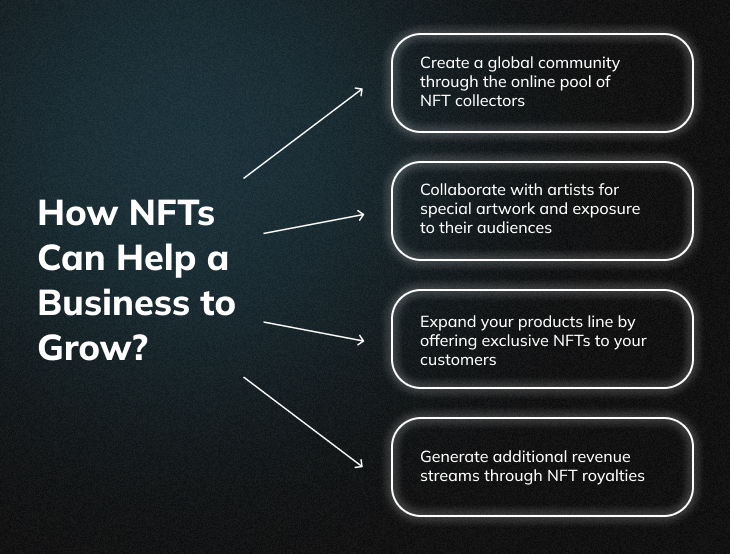
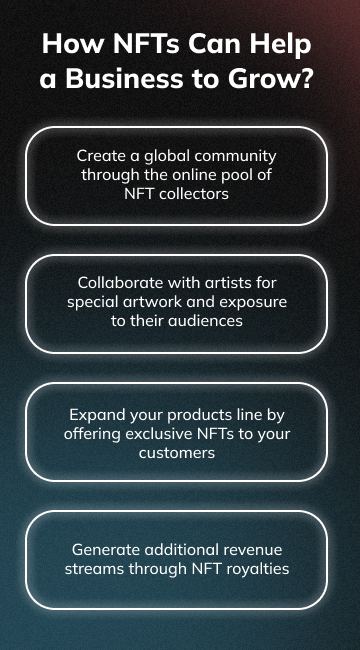
Back in 2014, Kevin McCoy and Anil Dash created the concept of NFTs as a platform for artists to claim ownership and earn genuine money over their artwork. This led to the creation of the first NFT ever, Quantum, designed by McCoy’s wife, Jennifer McCoy. Fast forward to 2021, NFTs experienced a boom in interest from collectors and investors because of NFT collections like CryptoPunks, Bored Ape Yacht Club and many other collections worth millions. What makes these concepts worth investing in is the whole system behind them. NFTs are tokenized via a blockchain, they have unique identification codes and metadata attached to them to distinguish them from other NFTs and cannot be replicated. NFTs also come in many shapes and types and the most interesting question is, how do they fit within the music industry?
Whilst musicians would traditionally rely on selling CDs, performing in front of audiences and streaming their music to benefit from their artistry, nowadays, the methods for that are changing rapidly. A valid question to ask yourself is how do NFTs work for music, but any good NFT agency like DigitalArtists would be experienced enough to answer that question to your benefit.
NFTs, as we covered, come in many forms tailored to different industries, and the music industry is a special one for the list. These enable the musician and label to connect with and grow their community, to offer exclusive music and limited-edition merch and experiences. Whilst this barely scratches the surface, let’s delve deeper into how the music industry can benefit from non-fungible tokens.
The music sector is one of the biggest nowadays to get recognition and to make money from. It’s also very important, because it is responsible for bringing talented people on the stage for millions of people around the world to admire and listen to. Without this industry, historical, modern and future voices would never be discovered, and many people could not discover music that they can get attached to and help them throughout life in one way or another. This is the reason why many people rely on this business, and why the people behind it know that it is always going to be vital for the world. Bearing that in mind, it’s obvious how important NFTs for music producers can be to expand their success. Furthermore, the music industry can be connected to different types of NFTs to expand both its audience and list of benefits.
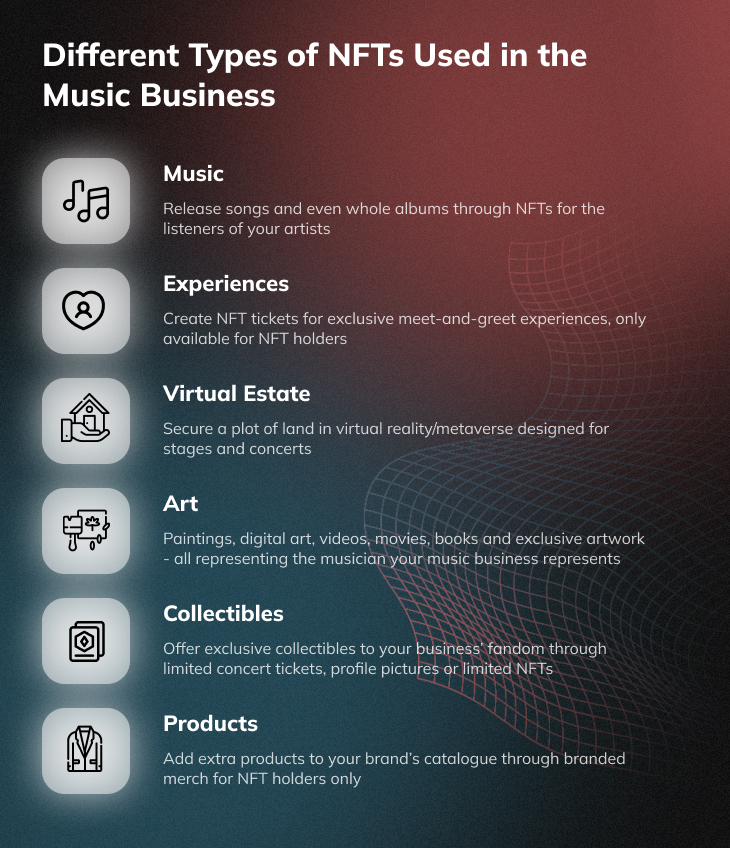
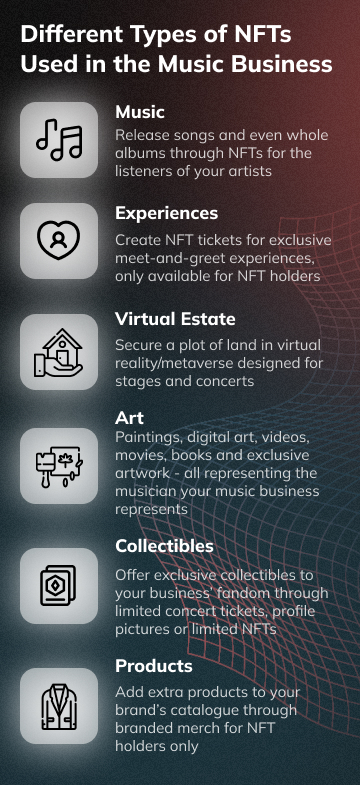
The clearest types of NFTs for music are exclusive albums, songs, limited-edition concert tickets and meet-and-greets. With what we said about how important the industry is to people, and with the usual behaviour of music fans, we know that fans always want to either showcase or have their idols around them. This translates to merch of all sorts. Connecting this with music opens a lot of doors for physical merch and equipment, like posters, t-shirts, PFPs, memberships and many more. So, it goes without saying, that connecting an artist to different types of products is always beneficial, and through the help of the different types of NFTs, this can be even easier to expand into the music business.
Streaming platforms for music and buying single music tracks are the most popular ways of obtaining music nowadays, but some people still fear the possibility of the platform collapsing and their investments disappearing. If you’ve built playlists of hundreds of hours of music, it’s reasonable to fear losing all that hard work. A way around that is to trust the process of NFT in music and acquire your music in the form of NFTs. It is the most secure way of owning a track or album, to verify its authenticity and provider and to store it on the blockchain, forever.
Buying physical tickets for a concert has always been a must-have memorabilia for music fans. At the time of Tumblr’s most-popular period of around 2013 and 2014, it was a very popular idea to share a picture of one’s wall covered in music posters and concert tickets. Whilst many still keep this tradition going, after Google/Apple Wallet was released, it became fashionable to collect those in one’s phone wallet. To enhance this experience for fans, given that having tickets digitally is the new black, musicians can use NFTs and collaborate with artists to provide limited one-of-a-kind concert tickets, which will always belong to the NFT buyer for them to admire.
There are numerous virtual spaces where people can interact with other players and most importantly show off who they are in the real world through virtual merchandise. With even more virtual spaces to be released in coming years, and with those expanding their numbers of players, virtual clothing and accessories will become a must-have. The idea of people being able to dress their virtual character with a hoodie featuring their favourite singer will be a popular one. To add on to this, given that characters can have their virtual land, showcasing their love for a particular musician through posters or even statues around their land will be a total hit within any virtual world.
Collectibles directly linked to a beloved celebrity is always on the wishlists of fans. Various musicians have different emblems, hand signs, unique objects used in songs or even on tour. All of these are perfect items to use as collectible memorabilia through NFTs for fans. And the unique perspective of that is the security of the blockchain. Every NFT can be traced back to the original producer of it because each NFT has a transaction and owner history, so it would be very easy for a fan to prove that they own that particular memorabilia NFT.
Interactive NFTs could be the most innovative gateway to bringing a redefined experience through. the NFT in music industry. The best known interactive NFTs to NFT buyers are collections where one buys two different NFTs and through combining both, one gets a whole different NFT. Usually, the gaming industry might profit the most from these because they can act as level-ups of different characters or to produce better equipment and add-ons.
Yo dudes!
— int art (@intartNFT) August 18, 2021
It's been 3 weeks since I released the original "the dudes".
They are the first interactive avatar NFT. They were generated while minted. You generated the DNAs randomly.
Even as the creator, I had no idea what the final series would look like. pic.twitter.com/kc078EoovB
With the help of an innovative-thinking NFT agency like DigitalArtists, an interactive NFT collection for your music business becomes a very accessible project. The ideas can vary from buildable lyrics – fans acquire words as NFTs, combine them and produce one-of-a-kind lyrics, which can generate more income for the business. This can also give the artist the chance to include these lyrics into a song and thus connect with the audience on an even deeper level because of producing something together, which the fans will surely appreciate.
The pros mentioned above create a remarkable set of benefits for using NFTs in the music industry. But they are not even the cherry on the cake. Royalties in terms of NFTs represent a payout for any secondary sales to the original NFT creator. You as the creator have the choice over the percentage of these royalties and then receive that percentage paid out. For example, if you were to sell one NFT at 1.5 ETH (≈1.700 USD), and were to set the royalty at 5%, which would be 0.075 ETH (≈130 USD), then you would get $130 every time your NFT is being sold to a new owner. Sounds like an incredible additional revenue stream without any effort involved, right?
Talking about the many benefits of NFTs in music is just theory, and like any new technology, it’s good to have clear examples of how those can be put to practise. This way, we can see the pros and cons of using different types of NFTs, their implementation in different businesses and what really works or not. The following examples are great for individual musicians and how they have made business through NFTs and for different platforms and how they’ve created a beneficial system for music streamers and fans through royalties on NFTs.
3LAU is an American electronic dance music (EDM) producer and DJ who has performed in many famous venues and festivals and remixed hit songs. Whilst being a very talented and successful EDM producer, known around the world, 3LAU, also pronounced like his last name Blau, is one of the first musicians to touch on NFTs in the music industry.
My friend @3LAU just made history by tokenizing the first full-length album in a record-setting $11.7M NFT auction. So glad to have this Ultraviolet Bronze NFT. Represents years of hard work and belief on his part. I’m fortunate to have followed his journey to this moment pic.twitter.com/vZ9uCpCtgw
— medved (@mattmedved) March 2, 2021
For the third anniversary of his Ultraviolet album, 3LAU decided to release 33 NFTs of it. These would grant the buyer different perks like access to unreleased music, remixed editions of the 11 original songs from the album and a physical vinyl of the Ultraviolet album. The auction started steadily by reaching $1 million, but three minutes before the final call, 3LAU decided that every new bid would set the timer back by three minutes, allowing for more bids. On record, the auction was stalled over 40 times resulting in several hours of delay. The auction totalled $11.7 million for the collection, with the most expensive NFT being sold for $3.6 million.
Mike Shinoda is a musician, singer, songwriter, producer and is best-known for co-founding and being part of the worldwide-celebrated rock band Linkin Park. Shinoda isn’t known for only one NFT project, but for several completely different and successful ones. His first NFT endeavour was the One Hundredth Stream NFT, initially sold for $30,000 – and currently with a 15% resale royalty – so if the NFT were to be resold at $35,000, Shinoda would get $5,250 in royalties! The Linkin Park co-founder is also known as the first major label artist to release a song as a ten-part NFT called Happy Endings featuring Iann Dior and Upsahl.
ZIGGURATS is a music+art release, available as NFT & on streaming. The NFTs are in "profile pic" style. When you mint one, you get a randomly generated character as your "album cover." Here are some closeups of some of the possibilities.
— Mike Shinoda (@mikeshinoda) November 23, 2021
Public mint Dec 2
Streaming Dec 3 pic.twitter.com/kabMDaNP7D
Ziggurats is notably Shinoda’s biggest project so far and the word, ziggurat, represents pyramid-like stone structures in ancient Mesopotamia used to worship the gods. Because those buildings were built in layers, Shinoda decided to name his layered structure of an NFT project after them. The collection is the first generative NFT mixtape including 5000 one-of-a-kind audio and visual NFTs produced by Mike Shinoda himself. Staying true to the NFT concept, no two Ziggurats NFTs are the same. The NFTs had the initial price of 15 XTZ (Tezos cryptocurrency) which equals 10.38 USD at the time of writing, and the collection raised around $500,000.
Anotherblock.io is a revolutionary way for fans to truly connect with the music industry. The way it works, in short, is that people can “collect” tracks and earn royalties on them. Every time we, the music listeners, stream music online, the label, artist and any other co-owner of the music rights receive royalties. Anotherblock.io enables people, other than the producers and artists, to own rights over top hits added to the platform and to earn money through owning them. All collectable NFT songs are based on the Ethereum blockchain with smart contracts, meaning that the system in place is the most secure and reliable for this kind of transactions. Royalties are usually paid out every six months and collectors can sell their NFT song collections if wished. With that, platforms like Anotherblock unlock a new way of NFTs to benefit any business or individual.
The Sound.xyz platform is one of the greatest places where producers can create NFTs. It operates on a similar basis like Anotherblock.io, where people can collect music NFTs from their favourite musicians. Sound has a great history already, with a successful beta period of paying out $5.5 mil to 500 artists, like Snoop Dogg, for a collective 1,600 song NFTs.
Web3 offers us the chance to get something right for artists:
— sound.xyz (🎧,🎧) (@soundxyz_) August 22, 2023
Instant, direct payments on every sale.
Including a cut of resales.
Co-founder of Sound, David Greenstein, believes in the platform because it enables people to bring their behaviour toward music onchain/online. He believes people love to associate music with their identity, so statements like “I knew this artist before they got famous” are something many people would be proud of. Well, through Sound.xyz, proving that statement has never been easier. And whilst listening to music through Sound is free, fans can buy the tracks and have a smart contract through the secure blockchain, whilst supporting their favourite musicians.
Royal.io is the last platform for NFT in music on this list, but without a doubt, the one with most famous artists on it. Artists like Diplo, The Chainsmokers and 3LAU. These artists are ones who believe in the future of NFT music, having several NFT projects themselves, and are becoming part of a movement, which allows for other musicians like them to set their own rules over their own music.
NFTs go beyond owning a JPEG. At royal, we’re just beginning to scratch the surface of how we can use blockchain technology to shape the future of music.🧵
— royal (@join_royal) February 10, 2022
Similar to the other two NFT music streaming platforms, Royal.io offers fans to buy and trade music ownership and earn royalties, depending on how well the song is performing. On top of all, musicians can interact with NFT holders by providing exclusive perks like merch, private listening parties, meet and greets and whatever else they want to do to surprise their fan circle.
It might have been impossible to realize the idea of the NFT in music industry when the first NFT ever was created. Although it wasn’t the main goal when this happened back in 2014, NFTs have always been the backbone to support artists and their ownership over their own artwork.
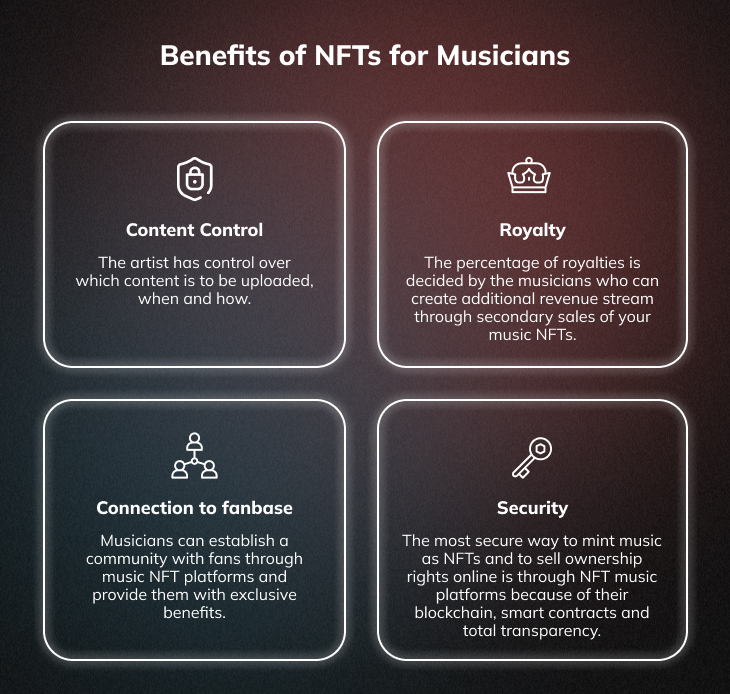

The music industry is going to expand and develop in the future, but with contracts and business becoming stricter on money, artists are not likely to be making as much money from their own creative process as they could be earning. Switching to NFT music can be the solution to this problem and it comes with many benefits. From being able to control which songs and albums you want uploaded and when that is to happen, the decisions are all yours to make. Furthermore, connecting with your fanbase through the music platforms is easier than before and with the platforms’ security, through the blockchain and smart contract system, this is your best bet for a successful business.
NFTs are the future for many different industries. There is both an outstanding history and secure future of how these industries have benefitted from NFTs, all while the music industry might be the leading one in the list. Musicians have a whole expanding world in front of them, which enables them to start earning what they truly deserve in exchange for their creativity and talent. They have the chance to trade music in the most secure way whilst unlocking a new platform to interact with their fans and create a loyal fandom. Following those lines, it’s pretty clear how NFTs are changing the music business.
If you’re still wondering how do NFTs work for music, then it might be of your best interest to contact an experienced NFT agency like DigitalArtists. With the help of a dedicated and professional team, you can get all your questions answered and be guided through the whole process of creating your perfect music NFT collection.
We so wish to have been able to turn this article in a song, but it would either have had to be an hour long song or a couple of albums. Instead, let’s look at the most frequently asked questions about NFTs in music summarised in writing.
Music related NFTs, as we now know them, are not only available as songs and have a beautiful diversity. Whole albums are available as NFTs, but even EPs and songs alone come with stunning artworks to accompany the music. Concert tickets and meet-and-greets are experiences availbale to be tokenized through NFTs and even merch can be bought through NFTs and exchanged for the real product. One of the best things about NFTs is that they come in many different types, so whilst we have a current idea of what music NFTs can look like, the future will surely expand this list to many unimaginable assets and experiences.
Music businesses must always make sure to check the contracts provided from each different platform. Before uploading the music online and waiting for any sign of success, it should be checked if all ownership and licensing rights are cleared. All platforms have their Terms of Service detailed on their websites, but of course as an artist, you would have access to more information directly from the company. Because every platform provides different features, payment options and presumably copyrights, every business should make sure that they check these in detail.
The act itself to own a piece of music of your favourite artists translates to being member of a loyal fan base but can that be pushed further? Music NFTs are most often provided through special platforms like Anotherblock.io, Sound.xyz and Royal.io. These platforms enable the artists to interact with their fans in various ways. Some have post-like features and the artists can offer exclusive merch and benefits to people who have bought their music as NFTs. Adding to the list of how to foster fan loyalty is to offer exclusive concerts and meet-and-greets as NFTs. These are great ways to make sure your fans are interacted with, satisfied and have digital memorabilia of an event they will remember forever.